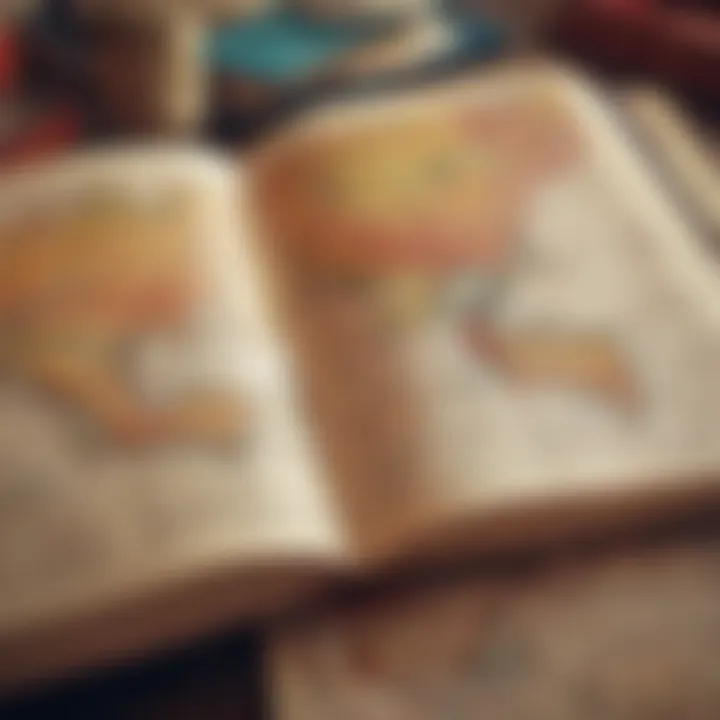Essential Histories: Top History Books to Discover


Intro
History is not just a collection of dates and events; it’s a tapestry woven from myriad stories, big and small, that articulate the human experience across time. Delving into the realm of historical literature enables readers to navigate this intricate web. By examining pivotal history books, individuals can glean insights that resonate today, providing context for contemporary issues and helping shape future aspirations.
This guide seeks to illuminate some of the most influential works that have shaped historical thought.
Categories of Essential History Books
Understanding the nuances of history starts with identifying the key categories that these essential texts fall into. This will help readers pinpoint where they might want to dive in.
- Biographies and Memoirs: These works offer a glimpse into the lives of individuals who’ve significantly influenced history. They give a heart and face to events, turning abstract ideas into relatable narratives. For example, The Diary of a Young Girl by Anne Frank humanizes the historical trauma of war.
- Political Analysis: Such books critique regimes, revolutions, and power dynamics. A notable mention here is The Origins of Totalitarianism by Hannah Arendt, where the author dissects the emergence of oppressive regimes, providing insights still relevant today.
- Social History: Exploring the cultural, economic, and social underpinnings of eras, these books broaden our understanding of daily lives. Works like A People's History of the United States by Howard Zinn offer fresh perspectives that challenge traditional narratives.
Book Summaries and Insights
Engaging with history doesn’t merely mean reading; it’s about embedding the lessons learned into our daily lives. Here are several significant titles to consider:
- Sapiens: A Brief History of Humankind by Yuval Noah Harari
- The Gulag Archipelago by Aleksandr Solzhenitsyn
- Summary: This sweeping narrative explores the evolution of Homo sapiens from foragers to rulers of the world.
- Insight: It challenges conventional wisdom and pushes readers to question the past and future of human society.
- Summary: A cornerstone of 20th-century literature, this work exposes the harsh realities of the Soviet prison system.
- Insight: Solzhenitsyn’s work serves as a harrowing reminder about the fragility of freedom and the human spirit's resilience against oppression.
"The more you know about the past, the less you will fear the future." – George Santayana
By pulling insights from such compelling narratives, one can not just understand history, but also find ways to apply its lessons to current social or political situations. For example, understanding how societies rebuild after conflict, as seen throughout War and Peace by Leo Tolstoy, can inform current discussions around post-conflict rehabilitation and reconciliation efforts.
The Importance of History in Modern Society
History is often viewed through a lens that separates the past from the present, yet it serves as a vital thread that weaves our understanding of society today. The exploration of historical events, figures, and movements enriches our comprehension of current circumstances, enabling us to engage with the world at large more meaningfully. At its core, history provides context; it allows us to see how societal norms and values have evolved over time and influences our attitudes toward contemporary issues.
"The past is never dead. It’s not even past." — William Faulkner
In modern society, delving into history is not just for academic pursuit; it promotes a more informed citizenry. When individuals are aware of their historical backdrop, they can make decisions that resonate with a nuanced understanding of their environment. For example, knowledge of different political movements can illuminate the reasons behind current debates or policies that may seem disconnected from the past to some.
Understanding the Past
To grasp the significance of the present, one must peel back layers of time, exploring how earlier experiences shape the current moment. History unfolds like a storybook filled with lessons, triumphs, and failures. Consider the civil rights movements across the globe; understanding the struggles and strategies employed by previous generations allows current activists to adopt and adapt those lessons. This continuity transforms time into a tapestry where every thread represents a moment, a voice, or a decision that echoes to this very day.
Further, history serves as a tool for recognizing cycles in human behavior. It can quicken the realization that certain patterns often repeat, be it in economics, politics, or social interactions. This reflection often arms individuals with insight that fosters a more nuanced approach to contemporary challenges.
History as a Tool for Critical Thinking
Engagement with history also sharpens critical thinking skills. It encourages readers to scrutinize sources, analyze motivations, and evaluate the context of variants. The act of piecing together narratives, assessing competing viewpoints, and differentiating between fact and interpretation cultivates a mindset that values inquiry and skepticism.
In classrooms and beyond, historical discussions compel individuals to articulate their views coherently and substantiate them with informed reasoning. As a result, historical study is as much about absorbing facts as it is about stimulating thoughtful discourse. The diverse perspectives offered by history give room for debate, challenge assumptions, and foster empathy through understanding varied experiences.
In summary, the importance of history in modern society extends beyond a mere recounting of dates and events. It forms the bedrock for understanding our existence today, equips us with a guide through the moral and ethical complexities we face, and nurtures the critical faculties needed for thoughtful citizenship in a diverse world.
Criteria for Selecting Exceptional History Books
In a world overflowing with historical texts, discerning readers must navigate a dense forest of options to find the gems that illuminate our understanding of the past. The criteria for selecting exceptional history books offers a compass of sorts, guiding readers through a landscape filled with underappreciated narratives and authoritative voices. Employing specific benchmarks allows one to assess which books not only inform but also engage the reader's mind and heart.
Authoritative Voices
When it comes to history, the qualification and reputation of the author matter immensely. Not every voice claiming expertise is equally credible. Consider historians like Eric Hobsbawm, famed for his analysis of the 19th and 20th centuries, or Simon Schama, whose narrative prowess emphasizes how historical events resonate in modernity. Books from authors with solid educational backgrounds, rigorous research methods, and a proven track record in historical discourse simply carry more weight. They lend authenticity to their narratives, and help readers feel more confident in the information presented.
Moreover, authorial viewpoint can significantly shape the narrative. An expert may be known for specific ideologies or themes, possibly familiarizing themselves with certain topics that others might overlook. This can be a double-edged sword: while it can garner expertise on one angle, it may lead to bias. A reader should be aware of this and seek texts that offer multi-faceted insights on core events or phenomena, thereby broadening their understanding.
Comprehensive Coverage vs. Focused Narratives
Another important criterion involves the tension between comprehensive coverage and focused narratives. Some readers prefer voracious overviews that touch on numerous events across time, while others seek out in-depth treatments of particular moments. Each approach has its merits, depending on what the reader aims to achieve.
For instance, a book that provides broad, sweeping coverage can contextualize particular events within a larger framework. “A People’s History of the United States” by Howard Zinn exemplifies this, as it locates American history through the lens of the marginalized. On the flip side, a focused narrative can inspire a keen understanding of complexities, like “Team of Rivals” by Doris Kearns Goodwin, which delves deeply into Abraham Lincoln's leadership dynamics.
A discerning reader must weigh their needs: if one is embarking on a broader educational journey or a focused study of a single event or individual. This consideration allows avid readers to tailor their exploration of history in a way that suits their learning style and objectives.
Writing Style and Accessibility
Lastly, the writing style and accessibility of a history book play critical roles in its selection. A narrative that flows fluidly allows for better retention and comprehension of the material. Readers often find themselves grappling with texts loaded with jargon or dense prose, leaving them stranded. Angela's Ashes, while set in a historical backdrop, uses accessible language woven into a heartfelt personal narrative, exemplifying how style matters.
In these times, accessibility is even more relevant due to varied reading backgrounds among individuals. Books that employ concise, engaging prose, and visuals when relevant, pave the way for broader readership.
In sum, examining the criteria for history books helps potential readers curate their selections effectively. Understanding the significance of authoritative voices, balancing coverage, and finding works with an engaging writing style all coalesce to ensure a thorough exploration of historical literature. The right choices not only inform but truly enrich one’s appreciation for the tapestry of human history.
Classics: Foundational Works in Historical Literature
When one dives into the waters of historical literature, the classics stand as towering beacons. These foundational texts are not merely remnants of the past; they are wellsprings of insight and understanding that continue to shape contemporary thought. The Classics offer a lens through which we can examine the intricate tapestry of human experience, providing context for events, cultures, and ideologies that prevail today.
Understanding classical works in history carries numerous benefits. First, they lay the groundwork for grasping how societies have evolved over centuries. They offer rich narratives that many modern interpretations reference, creating a bridge to our present-day dilemmas and achievements. Readers who engage with these texts develop a holistic understanding of the past, which is crucial for anyone striving to make sense of the complexities of the modern world.
- These texts encourage critical thinking and allow readers to grapple with conflicting perspectives.
- Moreover, they underscore the importance of human agency, highlighting how individuals and communities can sway the course of history.
Engaging with these books is not just about obtaining knowledge; it's about fostering a deeper appreciation for the craft of storytelling and the nuances of human nature. In this light, classical historical literature serves both as an educational tool and a source of inspiration.
Thucydides and Histories of War


Thucydides, a name well-known among history enthusiasts, penned one of the earliest and most significant works of historical narrative in 'The History of the Peloponnesian War.' His account is not just a record of military confrontations; it is a profound exploration of power, politics, and the human condition. Thucydides takes a unique approach by emphasizing the rationale behind events rather than simply reporting occurrences. His analytical style offers insights into why war occurs — emphasizing themes of ambition, fear, and honor.
"The strong do what they can and the weak suffer what they must." — Thucydides
Thucydides is often hailed as a precursor to modern historical methodology, providing a groundwork for empirical and evidence-based historical writing. His focus on primary sources and first-hand experiences has paved the way for future historians to challenge their understanding of events rigorously, making his work eternally relevant.
Herodotus: The Father of History
Herodotus, often referred to as the "Father of History," brings forth a narrative style that embraces both storytelling and factual recounting. His work, 'Histories,' is not just a catalog of events; it encompasses a rich tapestry of cultures, peoples, and customs from various regions. Herodotus’s ability to weave together narratives from different sources provides a multi-faceted view of the past, illustrating the interconnectedness of human experiences across geographical boundaries.
His observations on the customs and rituals of various societies not only enrich the historical narrative but also invite discussions on cultural relativism.
Herodotus's approach underscores the idea that history isn't just about dates and battles but about understanding the diverse experiences that shape civilizations.
The legacy of Herodotus endures as a reminder that history is a living entity, whose interpretations can shift over time in light of new evidence and changing contexts. Through his work, readers are encouraged to explore history with an open mind, looking at it not merely as a series of facts stitched together, but as a complex narrative woven through the experiences of countless individuals.
1970s to Present: Contemporary History Books
The landscape of historical literature since the 1970s has evolved remarkably, positioning contemporary history books as vital resources for understanding our times. This period has witnessed a surge in diverse narratives that challenge traditional viewpoints, providing readers with an array of lenses through which to view the past. Contemporary historians often tackle complex events and underrepresented perspectives, ensuring that history is not merely a collection of facts but a rich tapestry woven from multiple voices and experiences.
Contemporary historical texts not only offer insights into pivotal moments but also interrogate the narratives constructed around these events. The benefits of engaging with history from the late 20th century onward include the democratization of historical voices, the challenge to established narratives, and the application of interdisciplinary approaches that enrich our understanding. Therefore, recognizing the developments in this field is crucial for anyone seeking to grasp the intricacies of historical discourse and its implications on contemporary society.
Influential Historians and Their Works
A number of historians have made significant contributions to the field since the 1970s, reshaping the ways we perceive historical events and figures. One such historian is Eric Hobsbawm, whose works like "The Age of Extremes" offer a sweeping examination of the 20th century through the lens of social and economic change. His narrative delves into the interconnectedness of events, emphasizing the impact of the proletariat's conditions on broader historical shifts.
Another noteworthy figure is Howard Zinn, particularly known for his book "A People's History of the United States.” This work provides an alternative perspective by focusing on the experiences of those often left out of mainstream narratives, such as women, workers, and racial minorities. By centering marginalized voices, Zinn challenges readers to reconsider the story of America, prompting a reevaluation of accepted historical truths.
Significant contributors include:
- Simon Schama: His book "Citizens" reinterprets the French Revolution, melding history with personal narrative to enhance understanding of the emotional undercurrents of this period.
- Niall Ferguson: Known for his provocative work "The War of the World," which examines the 20th-century conflicts with a global lens, linking the sociopolitical dynamics across nations.
New Perspectives on Established Events
Contemporary history books often revisit well-known events with fresh insights, redefining our understanding of their significance. For instance, the Vietnam War, once seen strictly through a geopolitical lens, is now examined in terms of its cultural and social ramifications. Authors like David Maraniss in "They Marched into Sunlight" provide a multifaceted perspective that integrates personal stories of soldiers and civilians, creating a deeper emotional connection to history.
"Perhaps the most troubling aspect of understanding our past is realizing how history can be reshaped by those who write it."
Additionally, current works on the Civil Rights Movement, such as "The New Jim Crow" by Michelle Alexander, shift the focus to systemic racism and highlight ongoing struggles for equality. By embracing these contemporary narratives, readers gain a more nuanced view of the continuing impact of historical events on present-day society.
World History: Comprehensive Overviews
World history serves as a vast tapestry, interwoven with threads of human experience from various cultures, civilizations, and key events. The significance of understanding this expansiveness can't be overstated; it offers valuable insights into contemporary global dynamics, allowing readers to grasp how interconnected our societies truly are. With globalization reshaping our interactions, an overview of world history highlights not just individual experiences but the shared narratives that bind us together, giving context to current events and societal structures.
Global Narratives and Interconnectedness
When one delves into world history, the emergence of global narratives becomes a beacon illuminating connections across time and space. The idea that history does not occur in isolation is crucial. For instance, examining trade routes, like the Silk Road, reveals how goods, ideas, and cultures traversed distances, fostering exchanges that shaped civilizational growth. You can see how nations that participated in these interactions absorbed viewpoints and innovations from one another, creating a blending pot of evolution.
Moreover, looking at wars and treaties through a global lens offers insight into how conflicts in one region might interlink with events distant in both geography and time. The World Wars are a prime example — they weren't just European conflicts but resonated throughout the globe, affecting nations like the United States and Japan in profound ways. This interconnectedness reinforces the idea that understanding global histories equips us with the knowledge necessary to approach today’s complex international relations.
"A solitary planet cannot tell the secrets of its history; only when embraced by its neighbors can the true narrative unfold."
Represents Diverse Voices
One of the most enriching aspects of world history is its ability to amplify diverse perspectives and voices. Often confined by dominant narratives, many societies have rich stories that deserve to be recognized. History books that prioritize these underrepresented voices give readers a fuller picture. These narratives can come from indigenous peoples, female figures in history, or economically marginalized groups, contributing to a more nuanced understanding of historical events.
Incorporating diverse voices also promotes empathy and cultural awareness. For example, works that detail the experiences of colonized populations provide critical vantage points on events often narrated merely from the oppressor's perspective. Such books serve as platforms for stories that challenge established narratives, paving the way for a richer, more nuanced comprehension of what has shaped our world.
Furthermore, emphasizing these voices aligns with contemporary movements advocating for social justice and equality. In offering perspectives from various cultures and communities, historical literature fosters a climate of inclusive dialogue. Such efforts cultivate an appreciation for humanity's multifaceted experiences, drawing attention to the shared struggles and triumphs that define our journey together.
Cultural History: Examining Societal Evolution
Cultural history serves as a lens through which we can closely examine the intricate tapestry of human experience, revealing how art, beliefs, and social practices evolve over time. This section aims to highlight the significance of cultural history in illustrating societal evolution. By exploring how diverse influences shape human behavior and group identity, we gain a deeper understanding of the complexities that intertwine throughout centuries.
The Role of Art and Literature
Art and literature have long been the heartbeat of human civilization. They not only preserve history but also propel it forward. Art reflects societal values, struggles, and triumphs, acting as a mirror to the collective psyche. For instance, during the Renaissance, dramatic shifts in perspective from religious to humanistic themes in visual arts indicated broader societal changes, showing a growing appetite for exploration and knowledge.
Literature too, often lays out the frameworks within which societies understand themselves. The manifestos of the Enlightenment, for example, were pivotal in shaping modern democratic principles around the globe. Through novels, essays, and poetry, authors explore personal and collective struggles, challenges of class, race, and gender complexities that continue to inform current societal debates. The interplay of art and literature ultimately enlivens the bones of historical data, giving sense to the stories untold.
"Art enables us to find ourselves and lose ourselves at the same time." – Thomas Merton
Understanding this role of art is crucial, as it allows readers to grasp the wider implications of cultural movements. Noteworthy works such as The Great Gatsby by F. Scott Fitzgerald or the paintings of Van Gogh can help encapsulate the zeitgeist of their respective eras. They serve as tools for reflection, enabling us to examine how specific cultural moments influence our current understanding of humanity.
Employing Personal Narratives
Personal narratives in cultural history provide an intimate glimpse into the lives of individuals who have participated in significant historical events. These stories convey not only the factual timeline of events but more importantly, the lived experiences that accompany them. Whether it’s factions struggling for rights or individuals portraying the effects of war, these narratives lend voice to the often overlooked anecdotes.
Individual accounts provide context that mere facts cannot. They speak of resilience, resistance, and aspiration, painting a fuller picture of society at large. Consider the autobiographies of historical figures like Nelson Mandela or Anne Frank. Writing such as Long Walk to Freedom and The Diary of a Young Girl illustrate critical moments in history through personal experiences, enabling readers to connect on a deeper emotional level. This intertwining of the personal and historical fosters a more robust understanding of social change.
Additionally, utilizing personal narratives can challenge prevailing historical narratives. Often, dominant narratives overlook diverse voices. By amplifying these voices, we embrace a more nuanced understanding of history—one that accounts for complexities of culture and social dynamics. This approach encourages critical thinking and serves as an invitation to reflect on one’s own place in the broader historical narrative.
In summary, the study of cultural history not only enriches our understanding but also encourages profound questions about human existence. Through both art and personal narratives, we draw meaningful connections that prompt continued exploration and discussion, ensuring that the lessons of the past remain vital to our understanding of the present and the future.
Biographies and Historical Figures
Biographies and historical figures offer a unique lens through which we can explore the tapestry of history. They serve more than just a recount of events; they provide context to epochs, decisions, and ideologies that have influenced the trajectory of civilizations. When we delve into the lives of influential individuals, we don't merely grasp their personal stories but also understand the broader societal dynamics at play during their lifetimes. This understanding elevates our insight into crucial periods of history and allows for a nuanced interpretation of past human behavior.


One of the most significant benefits of engaging with biographies is the relatability they offer. Reading about the trials and triumphs of historical figures can make the past seem less like an insurmountable time bubble and more like a continuum of human experience. Each biography becomes a bridge connecting the past with the present, highlighting how the choices and paths taken by individuals can resonate through time.
Additionally, biographies often serve to illuminate neglected or underrepresented voices in history, prompting a reevaluation of what we consider important historical narratives. This creates room not just for a diverse array of figures in biographies, but also encourages readers to reflect on their surroundings and understand the complexities within their own lives.
Formative Lives in History
Within the realm of biographies, some figures stand out as particularly formative—individuals whose actions fundamentally altered the course of history. Take, for example, Nelson Mandela. His journey from political prisoner to the first black president of South Africa is not just a gripping tale of resilience; it is also a powerful narrative about the struggle for justice and equality. Through Mandela's life, we can explore the intricacies of apartheid, global advocacy, and human rights, gaining insights into the broader social movements that shaped the 20th century.
Similarly, Marie Curie, the first woman to win a Nobel Prize, plays a vital role in our understanding of science and gender dynamics. Her pioneering research in radioactivity not only contributed to medical sciences but also paved the way for women in STEM fields. Reading about her life illuminates the struggles and victories in both the scientific community and society at large.
Through these lives, students and history enthusiasts can glean lessons about perseverance, ethical decision-making, and the ripple effect of one person's endeavors in the fabric of time.
Analyzing Leadership and Decisions
The analysis of leadership and the decisions made by historical figures is a critical aspect in studying biographies. Leaders are often faced with choices that involve weighing up complex moral dilemmas against the backdrop of their time. These decisions are pivotal because they not only shape personal destinies but also set the course for nations and societies.
For instance, Winston Churchill during World War II is a prime example of how decisive leadership can galvanize a nation amidst adversity. His resolve and rhetoric during one of history's darkest hours inspired the British populace and helped rally the Allies against tyranny. Understanding Churchill's decisions, including his stance on collaboration with the United States and the USSR, sheds light on the multifaceted nature of leadership in crisis.
Moreover, analyzing counterexamples, such as Adolf Hitler, shows how misguided decisions can lead to catastrophic consequences. Hitler’s choices not only obliterated millions of lives during the Holocaust but also plunged the world into a war that redrew boundaries and altered global power dynamics. By scrutinizing such figures, we draw important lessons about the ethical implications of leadership, motivating current and future generations to consider their responsibilities as they navigate their paths.
"The one thing that you must always remember is that the choices you make are not just yours alone; they echo through time."
Biographies and historical narratives empower us to see beyond data and dates, immersing us in the lives that birthed ideas, inspired movements, and instigated change. They urge us to critically analyze the legacy left behind by these figures, ensuring that we learn from both their triumphs and failures.
Historical Fiction: Blending Fact with Imagination
Historical fiction serves as a unique intersection where reality and creativity converge. It allows readers to engage with historical events in a way that is both informative and immersive. By utilizing imaginative narratives, authors can bring the past to life, transforming cold, hard facts into relatable and compelling stories. This genre not only enhances our understanding of history but also broadens the context in which these events are perceived. In essence, historical fiction bridges the gap between academic history and popular understanding, creating a space for exploration and discussion.
Purposeful Storytelling
One of the standout features of historical fiction is its purposeful storytelling. Authors meticulously weave factual events with imaginative narrative threads, constructing a tale that resonates on multiple levels. This approach cultivates a deeper emotional connection for the reader, who often finds themselves pondering the lives of historical characters as though they were their own neighbors. Whether it’s the trials of a soldier during war or the aspirations of a common folk during turbulent times, these stories illuminate the human experience against the backdrop of history.
The best historical fiction not only seeks to entertain but also to educate. For instance, works like All the Light We Cannot See by Anthony Doerr use a narrative lens to reveal the profound consequences of World War II on everyday lives. By focusing on personal stories amid grand events, the genre fosters empathy and understanding—allowing readers to step into the shoes of those who lived through significant moments in time.
Key Elements of Purposeful Storytelling
- Character Development: Engaging characters help to ground heavy historical contexts in relatable experiences.
- Research Integrity: Good historical fiction incorporates accurate details, lending authenticity to the narrative while maintaining storytelling fluidity.
- Themes: Universal themes of love, loss, and bravery intertwine with historical events, making the past resonate with modern readers.
Impact on Public Perception of History
The impact of historical fiction on public perception of history is substantial and multifaceted. By presenting intricate narratives that blend fact with creativity, these books occasionally shape readers' understanding of historical contexts, often sparking a deeper interest in the events themselves. When a book captures the essence of a time period, it can draw individuals into exploring the actual history further.
Studies have shown that readers of historical fiction often gain a clearer overview of certain eras than those who acquire their knowledge solely through academic texts. This doesn't mean that works of fiction replace factual history. Rather, they encourage a dialogue that can lead to increased awareness and appreciation for complex historical figures and scenarios. The storytelling can humanize what might otherwise be dry facts or distant timelines.
Moreover, historical fiction can challenge prevailing narratives, offering alternative points of view that can broaden the scope of how we understand significant events. A book like The Book Thief by Markus Zusak demonstrates how the morality and ethics of war can be grappling issues, allowing readers to question the narratives that they have learned.
"Engaging with historical fiction often plants the seeds of curiosity, prompting readers to dig deeper into historical truths and their implications in today's world."
Ending
In summary, historical fiction is not just an imaginative extension of past events; it's a crucial player in how society constructs its collective memory. By blending fact with imagination, it provides a lens through which readers can analyze historical narratives and their relevance to contemporary life. As we explore more history books, recognizing the significance of this genre becomes vital, encouraging both reflection and inquiry into the past.
Thematic Histories: Focused Studies of Key Events
The exploration of thematic histories serves as a lens through which specific events can be understood in greater depth. Rather than being presented merely as a sequence of dates and facts, these focused studies dive into the underlying causes, implications, and transformations catalyzed by particular phenomena. This approach not only enriches our comprehension of historical events but also allows us to draw parallels between the past and the present.
Thematic histories are especially significant because they allow for an evaluation of how events interconnect and influence one another. They highlight the complexity of human behavior and societal shifts, painting a picture of history as a tapestry woven with various threads—each thread representing a different theme, such as war, social movements, or political change. In this section, we will dissect two prominent themes: war and conflict, and social movements.
War and Conflict — A Central Theme
War has been a pivotal aspect of human history, shaping nations, cultures, and economies. The implications of conflict during different epochs provide insights into the evolution of societies. Histories focused on war often lay bare the strategic decisions made by leaders and the human cost paid by ordinary people, illuminating a grim reality that is sometimes overlooked in broader narratives.
Books that delve into specific wars, such as the American Civil War, World War II, or the Vietnam War, frequently dissect the myriad factors that led to these conflicts, including political motivations, social tensions, and economic strife. By studying these events thematically, we come to recognize the cyclical nature of conflict—how lessons learned (or unlearned) from past battles can resonate in present-day policies.
Furthermore, war histories often venture into lesser-known conflicts, shedding light on the perspectives of marginalized groups. This broader lens helps foster a more inclusive understanding of historical narratives. War is not merely fought on battlefields; it also manifests in the experiences of civilians, the management of resources, and diplomatic relations post-conflict. The examination of such stories allows us to grasp the profound impact of war beyond physical destruction.
Social Movements and Change
In stark contrast to the often-violent narratives of war, social movements provide a canvas where the forces of change unfold through collective human action. Historically, movements like the Civil Rights Movement in the United States or the Suffragette campaign in the UK highlight society's capacity for transformation.
These thematic studies explore how grassroots organizing, public perception, and individual courage converge to challenge oppression and advocate for justice. A thorough examination of social movements reveals how ideologies evolve over time, as the goals of activists resonate with or diverge from mainstream society.
Key literature in this category not only presents a chronology of events but also analyzes motivations and outcomes. For instance, books that focus on the women’s rights movement delve into the shifting roles of women in society and how their struggles for equality were met with both resistance and eventual legal recognition.
"Social change is the product of collective action, often driven by the conviction that a better future is not just possible, but imminent."
Through such narratives, we see the power inherent in social movements—they remind us that history is not solely defined by the powerful few, but shaped by the many who dare to resist. By emphasizing these themes, we can better understand our current societal landscape and the ongoing struggles for equity and rights in the modern world.
In summary, thematic histories focusing on war and social movements offer not only insights into the past but also critical reflections on human nature and society's ongoing journey toward progress. Books that capture these themes provide readers with the tools to analyze, critique, and engage with history actively, ultimately fostering a more profound understanding of the world around us.
Recommended Essential Reads
When it comes to understanding our intricate past, selecting the right history books can feel like searching for a needle in a haystack. Among countless options, a few stand out as essentials, offering remarkable insights while sparking curiosity. This section highlights the importance of these texts, focusing on how they anchor our grasp of historical events, provide depth in narrative, and illuminate various perspectives.
One crucial element in recommended reading is the authenticity of the narrative. Each book should be anchored in solid research, allowing readers to engage with credible accounts. These essential reads don’t just recount facts; they breathe life into history, making it relatable and applicable to our lives today. Consider how "The Guns of August” by Barbara W. Tuchman illustrates the complex web of decisions that led to World War I, enabling us to better comprehend the consequences of leadership and conflict.
Top Ten History Books to Consider


- Sapiens: A Brief History of Humankind by Yuval Noah Harari
This book weaves together biology and history, tracing the evolution of Homo sapiens from ancient phenomena to modern society. It prompts readers to question the beliefs and structures that shape our world. - The Splendid and the Vile by Erik Larson
Larson paints a vivid picture of Winston Churchill’s leadership during World War II, blending narrative history with personal stories that shed light on the human experience amid war. - Guns, Germs, and Steel by Jared Diamond
Diamond tackles why some civilizations advance quicker than others, emphasizing environmental factors over racial superiority as vital to human history. - A People’s History of the United States by Howard Zinn
Zinn shifts the traditional narrative by emphasizing the voices and experiences of marginalized groups, encouraging readers to reconsider the American historical canon. - The Silk Roads: A New History of the World by Peter Frankopan
Frankopan explores the interconnectedness of civilizations through trade and culture along the Silk Road, illuminating a different perspective of world history. - The Immortal Life of Henrietta Lacks by Rebecca Skloot
This compelling narrative highlights issues of ethics in medical research and race, bringing to the fore the personal story behind ‘HeLa’ cells. - The Wright Brothers by David McCullough
A captivating examination of the dreams and struggles of Orville and Wilbur Wright, revealing how innovation and perseverance shaped modern aviation. - The New Jim Crow by Michelle Alexander
This important work dives deep into systemic racism and the criminal justice system, making a case for understanding how historical injustices continue to impact society. - Stalingrad by Anthony Beevor
Beevor’s vivid narrative of one of World War II’s crucial battles provides insight into the on-the-ground experiences of soldiers and civilians alike. - Alexander Hamilton by Ron Chernow
Chernow’s detailed biography helps readers understand the life of one of America’s founding fathers and the personal, social, and political struggles intertwined in his contributions to nation-building.
Diverse Genres and Perspectives
The realm of history is rich with diverse genres, offering something for every reader. This diversity isn't just refreshing; it allows for a more comprehensive understanding of historical narratives. Non-fiction, biographies, and historical fiction play distinct roles, each providing unique insights.
Biographies, like the one by Chernow, allow deep dives into individuals who shaped history. They reveal character, struggle, and triumph, making history palpable.
On the other hand, historical fiction invites imagination into the picture, filling gaps where historical records might be scant. Books like “The Book Thief” by Markus Zusak provide a heartfelt view of life during World War II, through the eyes of a young girl living in Nazi Germany. This kind of storytelling can evoke empathy in readers and connect them to historical experiences in a way that straightforward narrative often can’t.
Lastly, we’ve got academic texts that provide concise overviews of specific periods or events. They are essential for those looking for solid analysis and data. The Histories by Herodotus, for instance, while considered a classic, serves as both a historical account and a text that shaped the methodology of history-writing that follows.
In exploring these various genres, readers not only expand their knowledge but also develop an appreciation for the intricate tapestry that history is. Ultimately, the value of engaging with history lies not only in its facts but in the ways these texts invite us to learn from our past.
Impact of Historical Literature in Academia
The impact of historical literature on academia is profound, serving as a backbone for understanding the complexities of past societies and events. These texts do not merely recount tales; they weave narratives that invite critical analysis and scholarly discourse. In modern educational environments, the integration of historical literature enriches curriculums across various disciplines. It fosters an appreciation for context, promotes analytical skills, and encourages students to draw connections between historical events and contemporary issues.
Incorporating History Into Curriculum
Integrating historical literature into educational curriculums is vital for creating a well-rounded educational framework. It enables students to explore different perspectives and interpret various sources critically. When history is taught through literature, students can engage more deeply with the material, transforming dry facts into compelling stories.
- Contextual Understanding: Histories often provide rich background information that contextualizes major events, offering students a way to understand how those events relate to the present.
- Diverse Perspectives: Literature can represent voices from different backgrounds and cultures, helping students develop empathy and understanding.
- Critical Thinking: Analysis of historical texts encourages students to evaluate sources, discern biases, and consider differing interpretations.
The Role of Academics in Public Understanding
Academics play a critical role in bridging the gap between historical literature and public understanding. Their expertise not only enhances scholarly articles and lectures but also translates into accessible formats that inform the broader public. By engaging with historical literature, academics can:
- Disseminate Knowledge: Through lectures, public debates, and online platforms, scholars make history relatable, ensuring that narratives from the past resonate with today's audiences.
- Challenge Myths: Academic inquiry can dismantle longstanding misconceptions about historical events, providing clarity and nuances often missing in popular discourse.
- Promote Lifelong Learning: By advocating for an ongoing dialogue about history, academics encourage individuals from all walks of life to explore and question narratives, fostering a culture of inquiry.
"History is not just what happened, it is how we understand the past that shapes our present and future."
In summation, the impact of historical literature in academia is more than about books and readings; it encapsulates the pursuit of knowledge, critical engagement, and a reflection of society. By investing in the exploration of historical narratives, educators and scholars contribute to an informed, thoughtful populace.
Engaging with Historical Texts
Engaging with historical texts is a pivotal aspect of understanding the past and its implications on contemporary society. This engagement goes beyond mere reading; it involves an active interaction with the narratives, interpretations, and insights these texts provide. The significance of engaging with historical literature can be seen in several vital areas, including the way these texts shape our critical thinking, promote empathy, and encourage a nuanced understanding of past events.
Through the lens of history, readers become auditors of human experience, witnessing the successes and failures of civilizations. When one thoughtfully engages with these texts, they are not just processing information; they are participating in a dialogue across time. This analytical approach fosters a deeper appreciation of context and consequence, allowing for a more enriched comprehension of where we stand today. As we immerse ourselves in diverse historical narratives, we can also reflect on the broader aspects of society, cultures, and ideologies, opening avenues for deeper discussions about identity, motivation, and morality.
Strategies for Effective Reading
Reading history demands a strategic approach to maximize comprehension and retention. A few effective strategies can help readers navigate the complexities of historical texts:
- Prior Knowledge: Before diving into a book, familiarize yourself with the overarching themes and events that the author addresses. This groundwork aids in contextualizing the narrative.
- Active Note-taking: As you read, jot down thoughts, questions, and key points. This process creates a personal engagement with the text and reinforces memory.
- Reflect and Summarize: After finishing a chapter or section, take a moment to summarize what you've read. Reflecting on your understanding helps pinpoint areas that might need further exploration.
- Cross-reference Sources: Consult multiple sources to compare perspectives on historical events. This enriches your understanding and introduces you to diverse interpretations.
Implementing these strategies not only enhances reading effectiveness but also develops a habit of analytical thinking.
Developing Critical Perspectives
To effectively engage with historical texts, developing critical perspectives is essential. This means looking beyond the surface level of what is written and questioning the motivations, biases, and cultural contexts of authors and their works. Here are a few key considerations when adopting a critical lens:
- Authorial Intent: Consider why the author wrote the book. What message are they trying to convey? Understanding this can shed light on their narrative choices.
- Contextual Awareness: Recognize the time and place in which the author lived and wrote. Historical context shapes perspectives and can impact how events are portrayed.
- Diversity of Voices: Seek out texts that offer varying perspectives, especially those from marginalized groups. Engaging with a broad spectrum of voices presents a more comprehensive understanding of history.
- Question Everything: Approach texts with a mindset of inquiry. Ask "Who is this information serving?" and "What might be left unsaid?" This habit leads to a more nuanced understanding of the subject matter.
By rigorously engaging with historical texts through these lenses, readers can cultivate a well-rounded and critical viewpoint, transforming passive reading into an active dialogue with history.
The Future of Historical Literature
The landscape of historical literature is shifting under our feet like sand on a beach during a sunny afternoon tide. As we venture into the future, it’s clear that the very essence of how history is told, consumed, and understood is evolving. This is particularly relevant for those whose understanding of the past shapes their engagement with the present and future. An examination of these changes not only benefits students and professionals but aids avid readers in navigating this dynamic terrain.
Evolving Formats and Deliverables
The formats in which history is presented are diversifying more than ever. Gone are the days when history was solely confined to print books shelved in libraries. Today, historians and authors take advantage of multimedia platforms to present narratives that encompass audio, video, and interactive elements. Imagine reading about the American Civil War while simultaneously viewing maps, diagrams, or even augmented reality reenactments that bring the conflict to life. Such immersive experiences heighten engagement and understanding.
Consider the rise of podcasts where historians dive deep into specific moments or figures of the past. These platforms not only cater to a generation increasingly adept at consuming content on the go, they also democratize access to historical knowledge. More than ever, individuals can engage with compelling historical narratives without needing to flip through dense volumes. This movement towards user-friendly formats encourages new audiences to explore historical themes that might have previously felt inaccessible.
Key Points on Evolving Formats:
- Podcasts and Vodcasts: Engaging narratives in an auditory format brings stories to life, making history accessible to those with busy schedules.
- Interactive eBooks and Apps: Features like embedded videos, quizzes, and timelines create a more thorough learning experience.
- Webinars and Live Events: Historians engage directly with audiences, allowing for real-time interaction and a more personalized approach to learning.
Digitalization and Accessibility
As we plunge deeper into a digital age, the accessibility of historical texts is at the forefront of discussions. Digital archives and databases are growing rapidly. Institutions around the globe are digitizing their collections to preserve delicate manuscripts and artifacts. This creates an unprecedented opportunity for students, professionals, and anyone with an inquisitive mind to dive into primary sources that once were limited to specialized fields or physical locations.
Moreover, platforms such as Google Books and Project Gutenberg enable users to access a wealth of texts that span centuries. This effort toward digitization means that the treasure trove of history becomes a click or a swipe away. The democratization of knowledge fosters a deeper appreciation for the nuances of historical study.
End
The conclusion of this exploration highlights the profound significance of history in contemporary society. The ability of history to inform our present decisions and shape our understanding of the world cannot be overstated. In an age where misinformation can spread like wildfire, turning to well-researched historical literature provides a safeguard. It allows individuals to analyze past events with a critical lens, fostering an environment where thoughtful dialogue can flourish.
The Enduring Relevance of History
History remains relevant as it is not merely a collection of dates and events, but a reflection of human experiences and societal transformations. Its relevance stretches across diverse realms, including politics, culture, and social structures.
- Insights into Current Issues: By examining historical contexts, one can uncover the roots of modern conflicts or social issues. Consider how understanding the civil rights movement enhances our perception of today’s racial dynamics.
- Lessons to Learn: History teaches important lessons. Many leaders throughout history have made decisions where outcomes were less than favorable; learning from their choices can guide present-day actions.
- Cultural Continuity: Moreover, history helps us appreciate the cultural narratives that bind us. A shared understanding of our past can foster unity in increasingly fragmented societies.
Encouraging Lifelong Learning Through Historical Study
Engaging with historical literature promotes a culture of continuous learning. The knowledge gained extends far beyond mere facts; it cultivates a deeper comprehension of the human condition.
- Critical Thinking: Delving into history boosts critical analysis skills, prompting individuals to question motives behind events and narratives.
- Diverse Perspectives: Engaging with various authors often exposes readers to multiple viewpoints, enriching their understanding. For instance, examining both Western and Eastern interpretations of the same historical event can reveal biases and broaden comprehension.
- Connective Threads: History reveals the interconnectedness of human experiences. Exploring global histories can inspire empathy and a sense of shared humanity.
In summary, embracing historical study leads to a well-rounded perspective. Those who engage with history not only honor the past but also equip themselves to tackle present challenges more effectively.















